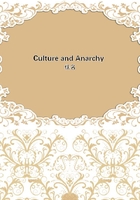
第37章
17 Just the same in religion as in literature. We have most of us little idea of a high standard to choose our guides by, of a great and profound spirit which is an authority while inferior spirits are none. It is enough to give importance to things that this or that person says them decisively, and has a large following of some strong kind when he says them. This habit of ours is very well shown in that able and interesting work of Mr. Hepworth Dixon's, which we were all reading lately, The Mormons, by One of Themselves . Here, again, I am not quite sure that my memory serves me as to the exact title, but I mean the well-known book in which Mr. Hepworth Dixon described the Mormons, and other similar religious bodies in America, with so much detail and such warm sympathy. In this work it seems enough for Mr. Dixon that this or that doctrine has its Rabbi, who talks big to him, has a staunch body of disciples, and, above all, has plenty of rifles. That there are any further stricter tests to be applied to a doctrine, before it is pronounced important, never seems to occur to him. 'It is easy to say,' he writes of the Mormons, 'that these saints are dupes and fanatics, to laugh at Joe Smith and his church, but what then? The great facts remain . Young and his people are at Utah;a church of 200,000 souls; an army of 20,000 rifles.' But if the followers of a doctrine are really dupes, or worse, and its promulgators are really fanatics, or worse, it gives the doctrine no seriousness or authority the more that there should be found 200,000 souls,--200,000 of the innumerable multitude with a natural taste for the bathos,--to hold it, and 20,000rifles to defend it. And again, of another religious organisation in America:
'A fair and open field is not to be refused when hosts so mighty throw down wager of battle on behalf of what they hold to be true, however strange their faith may seem.' A fair and open field is not to be refused to any speaker; but this solemn way of heralding him is quite out of place, unless he has, for the best reason and spirit of man, some significance. 'Well, but,' says Mr. Hepworth Dixon, 'a theory which has been accepted by men like Judge Edmonds, Dr. Hare, Elder Frederick, and Professor Bush!' And again: 'Such are, in brief, the bases of what Newman Weeks, Sarah Horton, Deborah Butler, and the associated brethren, proclaimed in Rolt's Hall as the new covenant!' If he was summing up an account of the doctrine of Plato, or of St. Paul, and of its followers, Mr. Hepworth Dixon could not be more earnestly reverential. But the question is, Have personages like Judge Edmonds, and Newman Weeks, and Elderess Polly, and Elderess Antoinette, and the rest of Mr. Hepworth Dixon's heroes and heroines, anything of the weight and significance for the best reason and spirit of man that Plato and St. Paul have? Evidently they, at present, have not; and a very small taste of them and their doctrines ought to have convinced Mr. Hepworth Dixon that they never could have. 'But,' says he, 'the magnetic power which Shakerism is exercising on American thought would of itself compel us,'--and so on. Now as far as real thought is concerned,--thought which affects the best reason and spirit of man, the scientific or the imaginative thought of the world, the only thought which deserves speaking of in this solemn way,--America has up to the present time been hardly more than a province of England, and even now would not herself claim to be more than abreast of England; and of this only real human thought, English thought itself is not just now, as we must all admit, the most significant factor. Neither, then, can American thought be; and the magnetic power which Shakerism exercises on American thought is about as important, for the best reason and spirit of man, as the magnetic power which Mr. Murphy exercises on Birmingham Protestantism. And as we shall never get rid of our natural taste for the bathos in religion,--never g 18 If our habits make it hard for us to come at the idea of a high best self, of a paramount authority, in literature or religion, how much more do they make this hard in the sphere of politics! In other countries the governors, not depending so immediately on the favour of the governed, have everything to urge them, if they know anything of right reason (and it is at least supposed that governors should know more of this than the mass of the governed), to set it authoritatively before the community. But our whole scheme of government being r epresentative, every one of our governors has all possible temptation, instead of setting up before the governed who elect him, and on whose favour he depends, a high standard of right reason, to accommodate himself as much as possible to their natural taste for the bathos; and even if he tries to go counter to it, to proceed in this with so much flattering and coaxing, that they shall not suspect their ignorance and prejudices to be anything very unlike right reason, or their natural taste for the bathos to differ much from a relish for the sublime. Every one is thus in every possible way encouraged to trust in his own heart; but ' he that trusteth in his own heart,' says the Wise Man, 'is a fool;' and at any rate this, which Bishop Wilson says, is undeniably true: 'The number of those who need to be awakened is far greater than that of those who need comfort.'
19 But in our political system everybody is comforted.